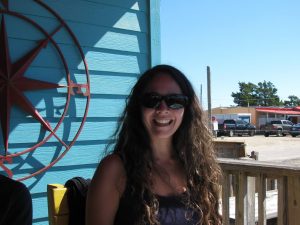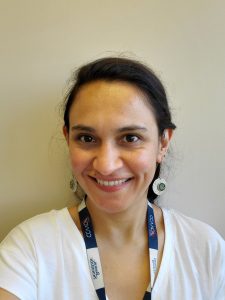The Team:

Soledad Sosa, Ph.D, Principal Investigator. My undergraduate training consisted in the study of melanoma biology, in the laboratory of Osvaldo Podhajcer and under the direction of Dr. LLera at the renowned Leloir Institute where I focused on the characterization of melanoma secretome using proteomics. From this training phase I published a very complete story in Proteomics (Sosa MS, et al., Proteomics 2007). My Ph.D. training program was carried out at the University of Pennsylvania in a joint program with the University of Buenos Aires. This training was under the mentorship of Dr. Marcelo Kazanietz, a well-recognized scientist in cell signaling studies in prostate and breast cancer. During this time I focused on the study of P-Rex1, a Rac-GEF protein, and how this factor contributed to the malignancy of mammary tumor cells. We demonstrated that P-Rex1 was important for migration and tumor development of breast cancer cells (Sosa MS, et al., Mol. Cell 2010). In 2010, I joined Dr. Julio Aguirre-Ghiso laboratory as a postdoc and worked on understanding how tumor cell dormancy is established once tumor cell disseminate to secondary organs. During my postdoc I was able to link the orphan nuclear receptor NR2F1 to a novel function during tumor cell dormancy (Sosa et.al. Nat. Com 2015). I found that NR2F1 was required for malignant cells to undergo dormancy by regulating retinoic acid signaling and cell cycle arrest in tumor cells. During my postdoc, I also worked in deciphering the mechanisms of dissemination from pre-malignant lesions (those formed even before a primary tumor is detected, such as ductal carcinoma in situ lesions) in breast cancer as a new source of disseminated cancer cells. This research project led to the publication of two paradigm-shifting papers in Nature in 2016.
In 2012, I was awarded a DoD Breast Cancer Postdoctoral Grant to study the processes responsible for early dissemination and target organ colonization by pre-malignant breast cancer cells (Harper, Sosa MS, et.al., Nature, 2016, Hosseini, et al., Nature 2016). In December 2016, I was promoted to Assistant Professor (investigator track) in the Department of Pharmacological Sciences at Mount Sinai. In 2016, as part of a collaboration team, we received a Melanoma Research Alliance (MRA) team award to study tumor dormancy in melanoma. The findings from this grant allowed us to secure another grant in 2019 from the Melanoma Research Foundation (MRF) to continue our work on dormancy in melanoma cancers. In 2017 I was awarded a K22-NCI-Transition Career Development Award to promote Diversity. The goal of this grant was to study the pluripotency and epigenome of disseminated tumor cells in a head and neck squamous cell carcinoma model. In 2017, I received a Susan G. Komen grant to investigate the mechanisms of dissemiantion of pre-malignant breast cancer cells. The findings from this grant allowed us to secure another grant in 2021 from the Breast Cancer Alliance to continue our work on early spread.

Alcina Rodrigues, lab technician. Alcina completed Bachelor of Pharmacy from Bombay College of Pharmacy, Mumbai, India (2017). She did her MS in Pharmacology at St. John’s University, Queens, NY under the mentorship of Dr. Jeanette C. Perron (2019). Her thesis focused on identifying the roles of different PI3K isoforms in mediating Bone Morphogenetic Protein 7 (BMP7)-induced chemotropic activities. She joined the Lab in November 2019 as a Lab Manager. Alcina has been working on different projects in the lab including her own project on melanoma and dormancy. In 2021, Alcina was selected to give a talk to present her research work in the Society for Melanoma Research. She contributed to the publication in Cancer Research paper on the role of NR2F1 during dissemination of pre-malignant breast cancer cells that was published this year, in April 26 2022. This Fall 2022 she will join the multidisciplinary Ph.D. program in Biomedical Sciences at the School of Graduate Studies at Rutgers, The State University of New Jersey. Congrats!!
 Carolina Rodriguez Tirado, postdoctoral fellow. Carolina did her PhD in Biomedical Sciences at the Albert Einstein College of Medicine and a two-year home-residency requirement in Chile as part of the Fulbright program that funded her studies. At Einstein, she worked under Dr. Jeffrey Pollard and Dr. Steven Porcelli describing polarizing factors that control macrophage roles during extravasation and metastasis of breast cancer. She was one of the first students to master the lung window technique for high resolution imaging of the living lungs in mouse models, a collaboration work with Dr. David Entenberg and Dr. John Condeelis. After that, she went back to Chile where she studied therapeutic strategies to mitigate radiation induced damage to normal tissue, specifically targeting microenvironmental signals derived from macrophages and mesenchymal stem cells. Then, she mediated an institutional agreement for research between the Universidad del Desarrollo in Chile and the University of Kansas in the US. In 2019, she decided to join my lab to continue shaping her career in the cancer field by studying the biology of disseminated cancer cells. In 2020, Carolina was awarded with a travel award from the prestigious European Association for Cancer Research (EACR) organization to present her work on early dissemination. In 2021, Carolina co-authored a paper published in the Journal of Experimental Metastasis on the discovery of a new agonist for NR2F1 to induce dormancy. In April 2022, Carolina published her first author paper from the lab in Cancer Research on the role of NR2F1 mediating dissemiantion of pre-malignant breast cancer cells. Congrats!!
Carolina Rodriguez Tirado, postdoctoral fellow. Carolina did her PhD in Biomedical Sciences at the Albert Einstein College of Medicine and a two-year home-residency requirement in Chile as part of the Fulbright program that funded her studies. At Einstein, she worked under Dr. Jeffrey Pollard and Dr. Steven Porcelli describing polarizing factors that control macrophage roles during extravasation and metastasis of breast cancer. She was one of the first students to master the lung window technique for high resolution imaging of the living lungs in mouse models, a collaboration work with Dr. David Entenberg and Dr. John Condeelis. After that, she went back to Chile where she studied therapeutic strategies to mitigate radiation induced damage to normal tissue, specifically targeting microenvironmental signals derived from macrophages and mesenchymal stem cells. Then, she mediated an institutional agreement for research between the Universidad del Desarrollo in Chile and the University of Kansas in the US. In 2019, she decided to join my lab to continue shaping her career in the cancer field by studying the biology of disseminated cancer cells. In 2020, Carolina was awarded with a travel award from the prestigious European Association for Cancer Research (EACR) organization to present her work on early dissemination. In 2021, Carolina co-authored a paper published in the Journal of Experimental Metastasis on the discovery of a new agonist for NR2F1 to induce dormancy. In April 2022, Carolina published her first author paper from the lab in Cancer Research on the role of NR2F1 mediating dissemiantion of pre-malignant breast cancer cells. Congrats!!
Multi-Disciplinary Training Areas:
Pharmacology and Therapeutics Discovery program [PTD], Cancer Biology [CAB]
